—Jada Pinkett Smith
—Dr. Grace Lee Boggs, philosopher and Detroit community organizer
—ECO Girl Parent
Poetry
Becoming Butterfly Women
The remarkable African American feminist poet Audre Lorde told us that “poetry is not a luxury.” Poetry is instead, in the view of water activist Lea Foushee, a dream, a vision, a song sent to the speaker from the mysterious within, without, and above. Poetry is the spirit that comes before and moves through any action for change. It is with this understanding of the power of words that two Native American women poets have chosen to share with ECO Girls their dreams for the future. These poems, written in dialogue with one another, are for the “Butterfly Women” who are protecting the earth today and the “Butterfly Women” to be who will carry on this work tomorrow. These poems are also the inspiration behind the ECO Girls logo.
The first poem is a song for Bear Butte, a sacred place in the Black Hills of the author's South Dakota home. It tells us that the earth is ancient, that power moves through wind, and that we can learn to be “earth warriors” standing against the storm. The image of the butterfly here calls attention to the notion attributed to “chaos theory” that the movement of a butterfly's wing can have great effect across the globe.

Bear Butte Song
by Lea Foushee, 1989
The Earth is sacred.
Water, the blood of the Mother,
overflows with life spirits
from thousands of years.
Power flies on the winds
slipping through the crack
between Earth and Sky.
Oh! Carry my voice to the ancient ones.
All my relatives, teach me
to be an Earth Warrior.
Teach me to walk in beauty,
wrapped in moonlight.
A Butterfly Woman,
I stand against the coming whirlwind.
The second poem is written in two languages: Anishinaabemowin, the language of the Ojibwe, Odawa, and Potawatomi First Peoples of the Great Lakes, and also in English. It calls our attention to the shores of the Great Lakes “inland sea” where stories and knowledge live on, and it reminds us to “save every sharp ray of sunshine.”
Maampii Temigad Nibwaakawin / The Knowledge is Here
For Lea Foushee and all the Memengwekwewag / Butterfly Women
by Margaret Noori, 2011
Aapiish aayaawaad niibinaabekwewag? / Where are the mermaids?
Aapiish ezhi-nokiiwaad? / What do they do?
Wenesh nagadawendaamowaad? / Where do they place their respect?
Aapiish odaminowaad nishimensag? / Where do the granddaughters play?
Aapiish ezhi-kitigankewaad aaking? / Where do they plant their gardens?
Wenesh nisostaamowaad? / What do they understand?
Maampii besho chigaaming ednokiiwaad. / Here beside the inland sea
Mikwenmawaan aadisokaan-saabiig. / they remember webs of stories
Kina gwaya nagadawendanaawaan. / and respect everything they see.
Biindigeg miinwaa gojing kina nikeyaa / Inside and outside and in all directions
Jiibikaawiwag jiibaayag wiiji-jibaakwewaad. / they have roots with the kitchen ghosts
Zhaabooniganan miinwaa zaagiiaasiged zhaabwiitoonaawaan. / and save every sharp ray of sunshine.
December/Water Haikus
Annika:
A lifeless nest. A bird’s nest still.
Melt. Melt. The snow falls.
Penelope:
Wild basking in the sunlight
Cats make me happy
Ellie:
gliding, gaily, gracefully
moon walking on ice
Allea:
I can’t get this ice skating
Making snowmen is easy
A Seasonal Round:
Good Wishes for Winter, Spring, Summer & Fall

Skip a Stone in Summer
By Tiya Miles
Skip a stone in summer,
across a rippling pond.
The frogs and toads are hopping;
the grasses wave their wands.
The growing things are thriving.
The sun is in full bloom.
And everywhere around us
looks like a garden room.
In town the farmer’s market
has fruit so plump and ripe:
cherries, plums, and peaches,
tomatoes red and bright.
Let’s skip a stone in summer,
then nap beside a glade.
The great and golden sunflowers
will be our noon-day shade.
So close your eyes, My Honey,
beneath the sun-lit sky.
The days are long and dreamy.
The clouds are floating by.
This poem is about water transforming into ice, and it also reminds us that our fresh water sources can be depleted if we are not careful about protecting them.
WATER
drip drop
until not
by Ken Mikolowski
Written for the University of Michigan College of Literature, Science & the Arts Water Theme Semester kick-off event, an Ice Percussion Concert, on January 12, 2011.




